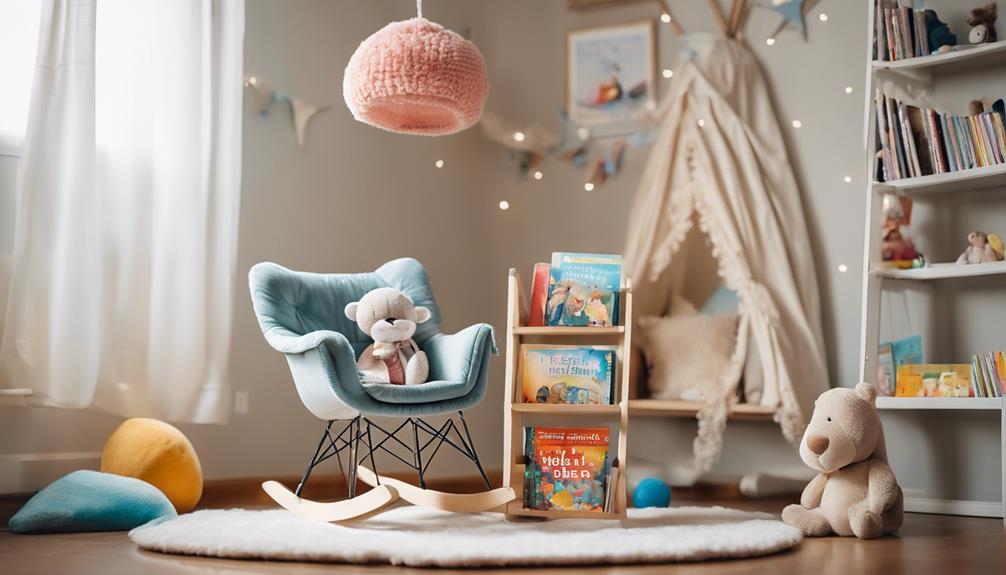To ensure baby book reading is both enjoyable and effective, consider selecting engaging books with interactive features. It’s helpful to point out objects in the book and utilize props to enhance understanding. Encourage bonding through shared reading experiences, which are essential for language development. Empower your child by allowing them to choose their books and exploring libraries for a variety of reading materials. Participate in interactive reading by using different voices and focusing on rhythm. Transform reading into a family activity to strengthen relationships and create lasting memories. By incorporating these strategies, baby book reading can be both enjoyable and beneficial. If you want to learn more about enhancing your child’s reading experience, continue exploring the engaging techniques provided.
Key Takeaways
- Choose engaging books with interactive features and colorful illustrations.
- Turn reading into a game by using props, encouraging sounds, and setting challenges.
- Read together to bond, communicate, and support language development.
- Empower children by letting them choose books based on their interests.
- Enhance the experience by visiting libraries for diverse book selections and positive associations.
Choosing Engaging Books
To kickstart your journey into making baby book reading fun and effective, begin by selecting books with engaging illustrations and interactive features. When choosing children's books for your little one, opt for colorful illustrations and simple, high-contrast images that can capture their attention and stimulate visual development. Look for board books with sturdy pages that can withstand chewing and exploring, ensuring durability for repeated reading sessions.
Moreover, consider selecting books with interactive elements such as touch-and-feel textures or lift-the-flap features. These interactive components can engage your baby in sensory exploration during reading time, making the experience more interactive and enjoyable for them.
Additionally, books with rhythmic, melodic language or repetitive phrases can be soothing and engaging for babies, fostering language development and early literacy skills.
Lastly, think about choosing books that feature familiar objects, animals, or daily routines. These familiar elements can help babies make connections to their environment and aid in developing cognitive skills through recognition. By selecting books with these features, you can make baby book reading both fun and effective.
Turning Reading Into a Game

You can make baby book reading more exciting by incorporating interactive storytelling activities, engaging book-related games, and role-playing during reading sessions.
These fun and interactive elements can help keep your baby engaged and make the reading experience enjoyable.
Interactive Storytelling Activities
How can interactive storytelling activities transform the act of reading into an engaging game for your baby? By incorporating interactive elements into your reading sessions, you can make the experience more fun and effective for your little one. Here are some tips to turn reading into an interactive storytelling adventure:
| Interactive Storytelling Activities | Description | Benefits |
|---|---|---|
| Pointing to Objects | Ask your baby to point to objects in the book to enhance engagement and comprehension. | Develops observational skills and understanding of the story. |
| Props and Toys | Use related props or toys to make the reading experience interactive and memorable. | Sparks imagination and creativity while reinforcing the story. |
| Sound and Gestures | Encourage your baby to make sounds or gestures in response to the story for language development. | Enhances communication skills and engagement with the narrative. |
Implementing these interactive activities can make reading a book not only educational but also an exciting game for your baby.
Engaging Book-Related Games
Engage your child in the joy of reading by transforming book time into exciting and interactive games. Reading games can make the reading experience enjoyable and educational for your little one.
Here are some fun and engaging ways to turn reading into a game:
- Set challenges like reading the most words in a minute to incorporate friendly competition into reading sessions.
- Reward your child for completing reading challenges to motivate and engage them in the reading process.
Use reading games as a tool to enhance skill development in a fun and interactive way.
Encourage participation in reading-related games to foster a love for books and make the reading process more enjoyable.
Role-Playing During Reading
Utilize role-playing techniques during reading sessions to enhance your baby's interactive learning experience and foster a deeper connection with the story. By engaging in role-play while reading to your baby, you can act out characters or scenes from the book, making the story come alive in a fun and imaginative way.
This interactive engagement not only helps develop your baby's imagination and creativity but also promotes active participation in the reading process.
Taking on different roles during storytime can enhance the interactive nature of the session, allowing your baby to better understand emotions, relationships, and social interactions portrayed in the book. Turning reading into a game through role-playing can make the experience more enjoyable and effective in promoting language development.
Reading Together for Bonding

Reading together with your baby is a wonderful way to strengthen your bond and create lasting connections through shared stories.
These moments of reading together not only promote language development and brain growth in your little one but also nurture a love for books and learning from an early age.
The interactive nature of reading sessions encourages communication and social interaction, deepening the bond between you and your baby as you explore the magical world of books together.
Bonding Through Shared Stories
By reading together with your baby, you strengthen the parent-child bond through shared experiences and quality time, promoting emotional connection and communication.
Shared storytelling not only fosters bonding but also enhances emotional connection and communication between you and your little one.
As you engage in reading activities, you're nurturing a strong foundation for your relationship while supporting your baby's language development, cognitive skills, and early literacy.
Interactive storytime routines with your baby provide sensory stimulation and promote cognitive growth, creating a positive and enriching environment for learning.
Through these shared stories, you're laying the groundwork for a lifelong love of books and reading in your child.
Connection Through Reading
Strengthen your emotional bond with your baby by engaging in shared reading experiences that foster communication and connection from the earliest stages of development. Reading with your child not only promotes Early Literacy but also helps create a secure and loving environment.
When you read aloud to your baby, you're enhancing their language development and cognitive skills, setting a strong foundation for their future learning. The interaction during reading sessions is a precious time for bonding, where you and your baby can connect on a deeper level.
Through shared stories and books, you build a positive relationship that will last a lifetime. Take advantage of this special time to cuddle up with your little one and explore the wonders of storytelling together.
Empowering Children With Choice

Allowing children the freedom to choose their own books can greatly enhance their reading experience and motivation. When kids have a say in what they read, they feel empowered and more connected to the material.
Here are a few reasons why empowering children with choice in their reading material is beneficial:
- Personalized Selection: Children can choose books that align with their interests, making the reading experience more enjoyable.
- Increased Engagement: Kids are more likely to be engaged and motivated when they've a say in the books they read.
- Independence and Decision-Making: Selecting their own books helps children develop decision-making skills and a sense of independence.
- Enhanced Literacy Development: Empowering children with book choices can lead to increased enthusiasm for reading, which in turn aids in their overall literacy development.
Enhancing Experience With Library Visits

Regular library visits offer babies exposure to a diverse collection of books and reading materials, enhancing their early literacy development. These visits not only introduce babies to a wide range of stories and information but also create a stimulating environment for their growing minds.
Libraries often host programs like storytime and interactive activities that further enrich the reading experience for babies. By exploring different books tailored to various interests and preferences, babies can discover new worlds and ideas, fostering a love for reading from a young age.
Additionally, visiting libraries early on can instill a lifelong passion for learning and exploration. It's not just about the books; library visits provide valuable bonding opportunities for parents and babies through shared reading experiences.
Embracing Reading Aloud

Make reading aloud to your baby a daily habit to nurture their language skills and love for stories. When embracing reading aloud, consider the following:
- Engage in Interactive Reading:
Encourage your baby to participate by pointing at pictures, making sounds, or turning pages.
- Use Different Voices and Expressions:
Make the storytelling experience lively by changing your voice tone, using facial expressions, and incorporating gestures.
- Focus on Rhythm and Cadence:
Babies benefit from the flow of spoken language, so emphasize the rhythm and musicality of your voice during reading sessions.
- Create Positive Associations:
Make reading time a special bonding moment by cuddling up with your baby, using cozy blankets, or incorporating a favorite toy.
Making Reading a Family Activity

Engage your entire family in the joy of reading together to strengthen bonds and cultivate a shared love for books from an early age. Family reading activities not only create bonding opportunities but also foster a love for reading that can last a lifetime.
When you read together as a family, you promote communication, language development, and cognitive skills in your little ones. By incorporating reading into your family routines, you establish a positive association with books and encourage a lifelong love for reading in your children.
In addition, family reading time enhances social interaction, strengthens emotional connections, and creates lasting memories for both parents and babies. Sharing stories as a family can help your children feel secure, build their vocabulary, and stimulate their imagination in a supportive environment.
Embrace family reading to not only bond with your loved ones but also to instill a deep love for reading in your children.
Frequently Asked Questions
How to Encourage a Baby to Read Books?
Encourage your baby to read books by choosing colorful board books, incorporating touch-and-feel elements, and reading with enthusiasm. Make it a bonding experience by cuddling close, using varying voices, and responding to their reactions.
How to Make Book Reading More Fun?
To make book reading more fun, you should engage babies with interactive elements like textures and sounds, use animated storytelling with silly voices and gestures, encourage them to touch and explore pictures, introduce rhythmic books, and create a cozy reading environment.
How Do I Make My Child Happy to Read Books?
To make your child happy to read books, engage their senses with colorful, textured, interactive books. Use funny sounds, animated faces, and cozy reading spots. Encourage participation and use repetition to create a fun and enjoyable reading experience for bonding and learning.
What Age Do Babies Enjoy Books?
Babies enjoy books at different stages. As early as 2-3 months, they like high-contrast board books. By 6 months, they respond to sounds. At 9-12 months, they enjoy simple stories. From 12-18 months, they like repetitive phrases.
How Do You Engage Children When Reading a Book?
You engage children when reading a book by encouraging them to participate, asking questions, and connecting the story to their lives. Use interactive techniques, let them choose books they like, incorporate games, and model good reading habits.
Conclusion
To sum up, making baby book reading fun and effective is as easy as ABC!
By choosing engaging books, turning reading into a game, reading together for bonding, empowering children with choice, enhancing the experience with library visits, embracing reading aloud, and making reading a family activity, you'll have your little one loving books in no time.
So grab a book, cuddle up, and watch your child's imagination soar to the stars and beyond!










